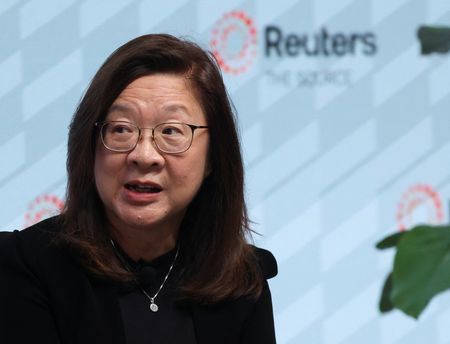By Mimosa Spencer
PARIS (Reuters) – Bitcoin’s soaring value has caught the attention of high-end fashion brands and retailers, prompting further interest in offering cryptocurrencies as a means of payment to tap in to fresh pockets of wealth and build loyalty with crypto investors.
Until recently, only a handful of luxury brands including LVMH watch labels Hublot and Tag Heuer as well as Kering-owned fashion brands Gucci and Balenciaga have experimented with crypto payment offers.
In recent weeks, upscale French luxury department store Printemps announced it was teaming up with the world’s largest crypto exchange, Binance, and French financial tech company Lyzi to accept cryptocurrencies including bitcoin and ethereum in its stores in France – becoming the first European department store to do so. The move, coming as bitcoin rises, has been noticed by other brands and retailers who are showing interest in joining in.
“There have been quite a few calls – it’s generated interest,” said David Princay, president of Binance France, who said the company is in talks with other luxury labels.
Luxury lighter and pen maker S.T. Dupont told Reuters it aims to accept cryptocurrency payments in two Paris stores before the holidays.
In the realm of experiences, cruise company Virgin Voyages began this month offering its first product accepting bitcoin as a payment option – a $120,000 annual pass for up to a year of sailing on its cruise ships.
Regulators have long warned that cryptocurrencies like bitcoin are high-risk assets, with limited uses in the real world. High volatility has been another barrier to wide adoption as a means of payment.
But pledges of support from U.S. President-elect Donald Trump, who is expected to bring in more friendly e-currency regulation, have fueled record-breaking rises for bitcoin. S&P analysts say the narrative is starting to shift, noting that blockchain innovation in financial markets could increase predictability for cryptocurrencies.
SEEKING INNOVATIVE BRANDING
Luxury labels have long sought to cater to affluent shoppers from the tech industry by opening stores in upscale Silicon Valley malls and issuing products like the Hermes Apple Watch, for example, which combines signature, stitched leather straps of the French Birkin bag maker with tech giant Apple’s connected timepiece.
Now, new wealth generated by bitcoin’s recent highs – topping $107,000 on Monday – comes as the luxury industry faces its biggest slump in years and searches for new sources of growth.
Offering cryptocurrency payments can be a way for companies to brand themselves as innovative rather than “a stuffy old brand that’s only selling to the boomers,” said Andrew O’Neill, digital assets lead analyst at S&P Global Ratings.
The payment option remains largely symbolic. Retailers usually reconvert the funds to euros or dollars to offset risks of volatility, while for most shoppers, payment methods are seen overall as “something that’s been solved” already by such transaction platforms as PayPal or Venmo, said O’Neill.
But for bitcoin investors who have seen a strong rise in the value of their investment, luxury goods – a designer handbag or high-end watch – are an obvious choice for diversifying one’s portfolio, analysts say.
In a sign of growing interest from designer labels, Balenciaga recently issued a leather card holder designed to hold “Stax” hardware from crypto wallet company Ledger. The black leather accessory, which retails for 350 euros ($368), includes a keychain and Eiffel Tower charm, and an NFC chip fitted underneath the brand logo. Ledger’s Stax Crypto hardware, its recently developed higher-end hardware with a curved touch screen, sells for $399 at Best Buy . The company’s “Flex” hardware, which resembles a mini Amazon Kindle, sells for $249 while the “Nano” version, which looks like a USB key, sells for $79.
REACHING YOUNGER CLIENTELE
Gregory Boutte, chief client and digital officer for luxury conglomerate Kering, has described the group’s strategy when it comes to technology as “test and learn” rather than “wait and see.” He emphasized the embrace of new technologies as key to reaching younger and Asian clientele.
Kering’s star label, Gucci, has since 2022 made purchases available through 10 cryptocurrencies for most of its products in the United States.
Printemps is working to expand its crypto payments service to New York City, where it plans to open a multibrand retailer in the Wall Street district in March.
Bitcoin’s rise in late 2021 prompted an initial flurry of interest from luxury brands with Tag Heuer, headed at the time by LVMH luxury scion Frederic Arnault, as well as Gucci, accepting payments in cryptocurrency the following year for some purchases in the United States.
One crypto advocate who recently used digital assets to make luxury purchases is Eunice Wong, an investor and influencer known as “Eunicorn.”
Wong said she used cryptocurrency to buy several high-end watches this year including an Audemars Piguet Royal Oak model. But she is not interested in being drawn in by high end brands seeking to build a closer client relationship, preferring to bypass traditional retail stores and sales routines. That takes too much time, in her view. “If I will buy, I’ll buy on the secondary market, not through them,” she told Reuters. “I want it now.”
(Reporting by Mimosa Spencer in Paris; Editing by Matthew Lewis)











